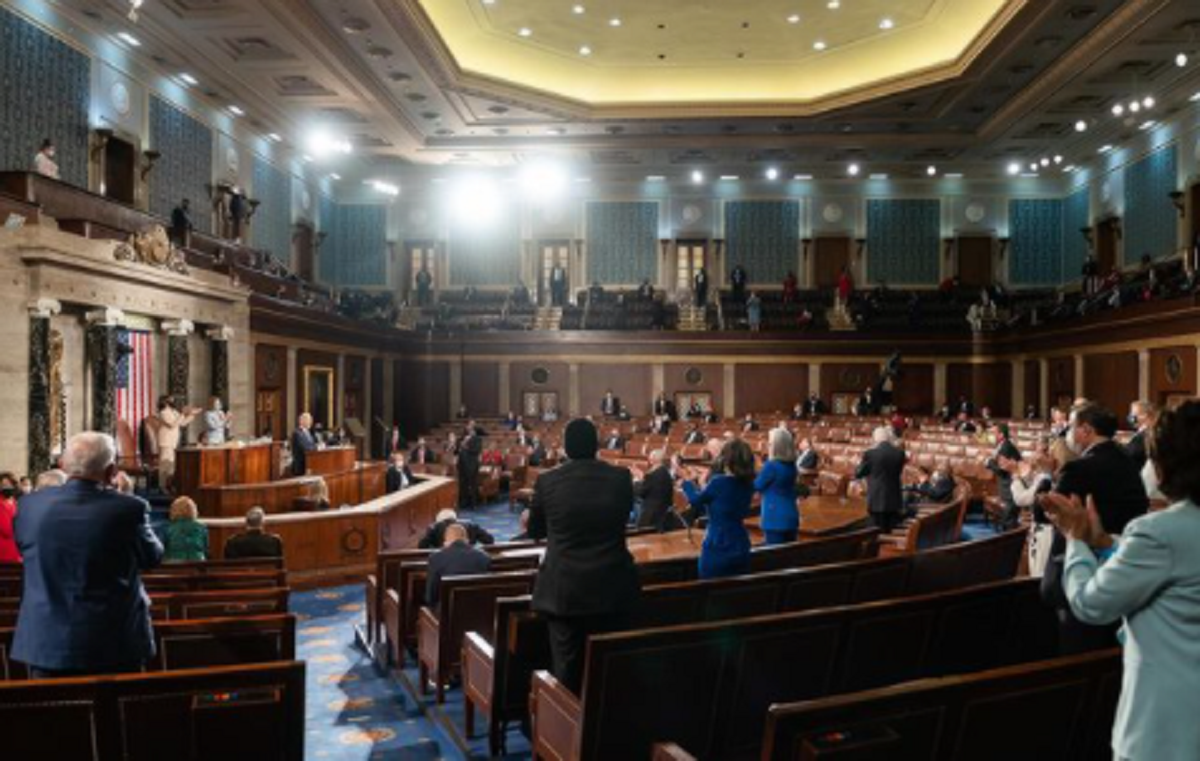On April 28, the 100th day of his presidency, President Biden gave his first joint address to Congress. As I watched his speech, I was reminded of all his administration has accomplished so far—and of all the work that remains to be done.
From his first day in office, Biden has taken meaningful steps to tackle our country’s compounding, interconnected crises: a global pandemic, a long-overdue reckoning with racism and systemic inequity, a democracy under attack, the climate crisis, mass unemployment, and economic inequality. He stacked his administration with people who are serious about tackling the climate crisis and environmental injustice and who reflect the diversity of our country. After rejoining the Paris Climate Agreement, he set an ambitious new commitment of reducing greenhouse gas emissions 50 to 52 percent below 2005 levels by 2030. He took steps to limit the climate impacts of cars and to protect our public lands and waters from oil and gas operations. After a decade-long, Indigenous-led struggle, he canceled the dirty tar sands Keystone XL Pipeline. And in late March, Biden introduced the American Jobs Plan, an infrastructure package that would tackle the climate crisis while creating millions of family-sustaining jobs.
All of this is a testament to the climate and environmental movements’ dedicated organizing and advocacy. These victories are the fruits of our rallies, our phone banks, our petition signatures, and our public comments. Despite the progress made over the past 100 days, our country remains mired in the same crises it faced during the Trump years. Our communities are still in the crosshairs of climate disasters and the ongoing disaster of racial injustice. People are still struggling to find work and make ends meet.
These problems are connected, and we can and must tackle them together. As President Biden said during his address last night, “When I think climate change, I think jobs.” He described the American Jobs Plan as a “blue-collar blueprint” for rebuilding this country’s infrastructure in a way that supports a clean energy future.
Appealing as it is, the American Jobs Plan remains a blueprint at the moment. It’s up to Congress to make it real by passing legislation. Our job is to ensure that the legislation that passes addresses our country’s crises at the scale and scope required. It should be rooted in the principles of the THRIVE Act, which was introduced to Congress this week. THRIVE calls for investing $1 trillion a year for a decade to create more than 15 million family-sustaining jobs while cutting climate pollution nearly in half by 2030 and countering structural injustice.
That includes creating more than 5 million jobs to upgrade our infrastructure—replacing every lead pipe in the country, building clean and affordable public transit, and ensuring a reliable electric grid. Another 4 million jobs in the clean energy sector would expand access to wind and solar power, electric vehicles, and clean and healthy buildings. The plan would also generate 4 million jobs to protect our wetlands and forests and invest in family farmers; and more than 2 million jobs to care for children and the elderly.
Job quality and job access matter just as much as job quantity. That’s why the THRIVE Act calls for all of these investments to be paired with strong labor, equity, and environmental standards to build a fairer economy instead of reinforcing the unjust status quo. The latest labor data show that without such standards, we’d create mostly mediocre, non-union jobs for predominantly white men. Instead, the infrastructure package should direct at least half of investments to frontline communities and require strong wage and benefit standards, access to unions, and equitable hiring that opens doors for women and people of color.
The American Jobs Act is just one of the Biden administration’s many opportunities to continue to be a climate leader and catalyze our transition to a clean energy economy. They can and must use every tool available to transition to 100 percent clean energy, electrify and modernize our transportation system, protect our natural carbon sinks, and eliminate subsidies for the fossil fuel industry, which is cooking our planet.
It’s up to us to ensure that Biden takes advantage of these opportunities to tackle the climate crisis while creating millions of family-sustaining jobs, cleaning up pollution, and addressing racial injustice. During his first 100 days, Biden showed that when we come together to demand change, he’ll listen. Now, we have to keep the pressure on, until we get solutions as big and interconnected as the crises we face.
